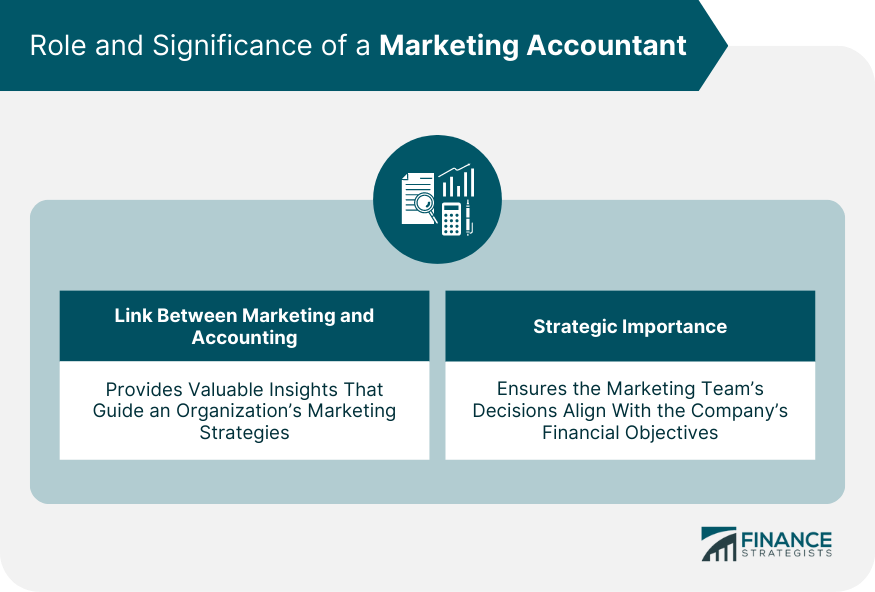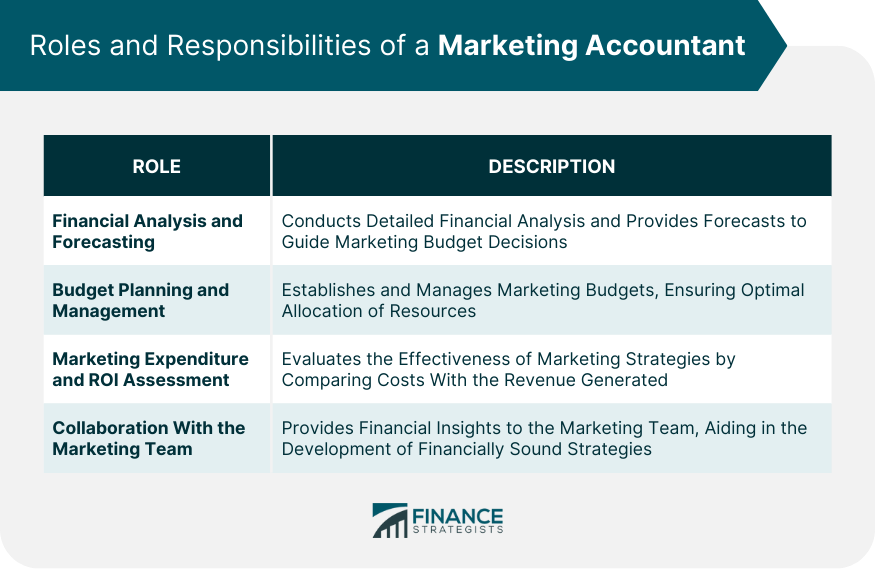A marketing accountant is a pivotal role that fuses the realms of accounting and marketing to drive business growth. As businesses recognize the value of making financially sound decisions tied to their marketing tactics, this role has surged to prominence. Playing a critical role in financial data analysis and interpretation, the marketing accountant sets marketing budgets and assesses the financial return from marketing investments. They collaborate closely with marketing units to monitor ad spend and quantify the financial outcomes of marketing initiatives. Their expertise in both finance and marketing empowers them to aid organizations in fine-tuning their expenditure for maximum profitability. Beyond this, they frequently offer strategic insights to help the company synchronize its marketing efforts with overarching financial objectives. The role of a marketing accountant extends beyond traditional accounting tasks. By connecting accounting and marketing, these professionals provide valuable insights that guide an organization's marketing strategies. They ensure that the marketing team's decisions align with the company's financial objectives. Marketing accountants build bridges between the financial and marketing aspects of a business. Their financial acuity helps marketing teams understand the financial implications of their strategies. In addition, they play a pivotal role in analyzing and interpreting data related to marketing costs and revenues, contributing significantly to the marketing decision-making process. The marketing accountant's role is strategically important as they help integrate marketing initiatives with a company's financial goals. By closely monitoring marketing expenditures and their outcomes, they provide valuable feedback to the marketing team, enabling more financially sound and effective marketing strategies. Marketing accountants wear many hats within an organization. Their roles are multi-faceted, requiring both financial acumen and marketing knowledge. One of the critical responsibilities of a marketing accountant is to conduct detailed financial analysis and forecasting. They analyze marketing costs, assess the profitability of different marketing channels, and provide forecasts to guide marketing budget decisions. Marketing accountants are often tasked with budget planning and management. They establish budgets based on past performance and future forecasts, manage marketing expenditures, and ensure optimal allocation of resources to different marketing channels and campaigns. Evaluating the ROI of marketing initiatives is another significant responsibility of a marketing accountant. They assess the effectiveness of different marketing strategies by comparing costs with the revenue generated. This analysis helps determine which marketing initiatives provide the best return on investment. Marketing accountants work closely with the marketing team, providing them with financial insights and guidance. They help the marketing team understand the financial implications of their decisions and contribute to the development of more financially sound marketing strategies. As with any professional role, certain skills and qualifications are necessary for success as a marketing accountant. Typically, a Bachelor's degree in finance, accounting, or a closely related field is a basic requirement for those seeking to work as a marketing accountant. This education provides the foundational knowledge necessary for understanding the intricate world of finance and accounting. In addition to the basic degree, some employers may prioritize candidates with advanced degrees or certifications, such as a Master's degree in Business Administration (MBA) or Certified Public Accountant (CPA) credentials. Specialized coursework or certifications in marketing can also add value, offering an edge in the competitive job market by demonstrating a comprehensive understanding of both disciplines. A marketing accountant must possess robust analytical skills, as the job primarily involves analyzing and interpreting complex financial data. They need to evaluate the performance of various marketing initiatives in terms of ROI, which requires a solid understanding of financial analysis techniques. This also entails proficiency in using financial software and tools, as well as spreadsheet programs for data analysis. Excellent communication skills are integral to the role of a marketing accountant. They must be able to translate complex financial terminologies and concepts into simpler terms that can be easily understood by non-finance colleagues, particularly those in the marketing department. This is vital for effective collaboration and strategic planning. A deep understanding of both marketing and accounting principles is pivotal for a marketing accountant. They must understand how marketing strategies impact the financial health of the organization and be able to provide actionable insights to optimize marketing expenditures. Furthermore, they should be adept at establishing and managing marketing budgets in line with the organization's financial objectives. By linking financial analysis with marketing strategy, marketing accountants play a crucial role in bridging the gap between these two disciplines. Financial literacy is critical for making informed marketing decisions. Marketing accountants ensure that marketing teams understand the financial implications of their strategies, helping to create more effective and financially sound marketing plans. Marketing accountants facilitate understanding by translating complex financial data into actionable insights for the marketing team. They help marketers understand the financial impact of their decisions and how those decisions align with the company's overall financial goals. A marketing accountant plays an indispensable role in modern business operations. By integrating financial acuity with marketing knowledge, they provide valuable insights that inform business strategies. The role of a marketing accountant has become especially significant in a world where every dollar counts and every decision can significantly impact a company's bottom line. Their detailed financial analysis and ability to translate financial data into actionable marketing strategies bridge the gap between marketing and finance. With this unique position, they contribute to the financial health and strategic direction of the company. As businesses continue to recognize the value of this role, the demand for skilled marketing accountants is set to grow. What Is a Marketing Accountant?
Role and Significance of a Marketing Accountant in Today's Business Landscape
Link Between Marketing and Accounting
Strategic Importance

Detailed Roles and Responsibilities of a Marketing Accountant
Financial Analysis and Forecasting
Budget Planning and Management
Marketing Expenditure and Return on Investment (ROI) Assessment
Collaboration With the Marketing Team

Essential Skills and Qualifications for a Marketing Accountant
Educational Background and Qualifications
Analytical Skills
Communication Skills
Understanding of Marketing and Accounting Principles

Bridging the Gap Between Marketing and Finance
Bottom Line
Marketing Accountant FAQs
A marketing accountant serves as the bridge between the marketing and finance departments, providing financial insights to guide marketing strategies.
Responsibilities include financial analysis and forecasting, budget planning, assessing marketing ROI, and facilitating collaboration between marketing and finance teams.
Key skills include strong analytical abilities, excellent communication, and a deep understanding of both marketing and accounting principles.
A marketing accountant integrates marketing budgets with business goals, evaluates financial performance, and provides recommendations for strategic improvements.
A marketing accountant ensures marketing teams understand the financial implications of their strategies and translates complex financial data into actionable insights.
True Tamplin is a published author, public speaker, CEO of UpDigital, and founder of Finance Strategists.
True is a Certified Educator in Personal Finance (CEPF®), author of The Handy Financial Ratios Guide, a member of the Society for Advancing Business Editing and Writing, contributes to his financial education site, Finance Strategists, and has spoken to various financial communities such as the CFA Institute, as well as university students like his Alma mater, Biola University, where he received a bachelor of science in business and data analytics.
To learn more about True, visit his personal website or view his author profiles on Amazon, Nasdaq and Forbes.















